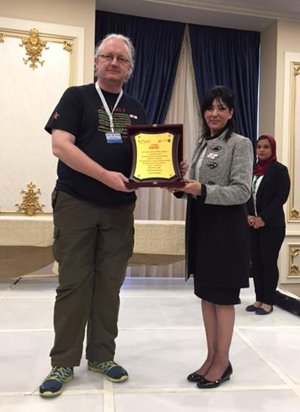Two scholars shared the Routledge Early Career Scholar Presentation Award at the 2017 Congress in Alexandria, Egypt. Both Aad Haverkamp, from Radboud University Nijmegen, and Zineb Belmaati Cherkaoui, Université Paris Ouest Nanterre La Défense, received the award, which includes £75 in books from Routledge.
Aad Haverkamp’s paper was “From modest role models to fallen legends. Representation in Dutch sports biographies, 1928-2014”. In sport, stories matter. Everything the public knows about athletes is mediated through images and texts. Biographies of sportspeople are one of the most important media in which these stories take shape. Consequently, they influence our way of thinking about sports and its eye catching practitioners. But how to deal with the subjectivity, poor research and low quality that, according to critics, seem to be defining features of the genre? This paper addresses this question and critically scrutinizes the nature of sports biographies as historical sources. In the process it advocates a ‘constructionist’ approach to biographies, as opposed to a ‘historist’ approach. This means that sports biographies should not primarily be utilised to gain insight into how athletes have actually lived their lives, but to learn how their life stories have been constructed over time.
Biographies of Dutch athletes, published between 1928 and 2014, have been analysed within this conceptual framework. This paper shows that the dominant way of representing Dutch sportspeople has significantly changed since 1928. Until the late 1960s, biographers depicted athletes mainly as modest role models who kept their feet firmly on the ground. This changed during the 1970s, when writers of life stories started to present sports people as assertive, sturdy, anti-authoritarian people. From the 1990s onwards, biographers increasingly tried to show ‘the person behind the athlete’ by characterising them as vulnerable human beings who struggled with all kinds of emotional and psychological problems. Finally, this paper addresses the question of how these variable modes of representation relate to broader social discourses and practices in Dutch society at large.
Zineb Belmaati Cherkaoui,’s paper was “The political use of regional sport events: a comparative approach of the Mediterranean Games in Tunis (1967-2001)”. The Regional Games took off during the second half of the 20th century which has been marked by drastic mutations (decolonization, cold war, third world, etc.). The Mediterranean Games (MG) symbolizes a wish of pacification and fraternization between the Mediterranean people. The first official edition (1951) of these games was held in Alexandria (Egypt). During the fourteenth IOC session (1947), Mohamed Taher Pacha, President of the Egyptian Olympic Committee and member of the International Olympic Committee for Egypt, proposed the idea of gathering Mediterranean sportsmen around a quadrennial event honoring the Olympic ideals of peace, equality and respect. However, this area is located in a zone of large-scale geopolitical stakes revealing North-South divide and numerous territorial rivalries. Thus, government attempts to make use of these Regional Games as a policy window (Kingdon, 1984) reflects its geopolitical ambitions. This work leans on archival investigations provided by the Olympic Studies Center, Tunisian Olympic Committee and various press institutions so as to collect evidences about the stakes related to the organization of two MG in Tunis. Following a comparative approach, this presentation proposes to shed light on these two games: How do these events contribute to emphasize the regional influence of Tunisia?
On the one hand, the fifth MG (1967) was held in Tunis under the presidency of Habib Bourguiba. This edition coincides with the first female participation to the Mediterranean Games. As a political entrepreneurship (Payen, 1967), Bourguiba aims to position Tunisia as a modern and progressive State. On the other hand, the fourteenth edition (2001) took place in the same city under the president Zine El Abidine Ben Ali. Besides, this Tunis MG represents the stagnation of the female participation in this sport event. These two editions set a successful example to analyze the political protocol (Ihl, Deloye, & Haroche, 1997) so as to show the state power and increase the influence of Tunisia in the Mediterranean world (Becker, 1982).

